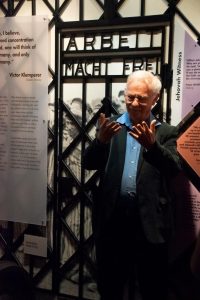At sundown Wednesday night, millions of Jews around the world will celebrate Passover. Known in Hebrew as Pesach, Passover commemorates the exodus from slavery in Egypt over 3,000 years ago. At the Seder, the story of the exodus is remembered every year.
This year with social distancing during the COVID-19 Novel Coronavirus pandemic, local Holocaust survivors in Cincinnati are celebrating the holiday differently. Utilizing technology like Zoom video conferencing, they are still finding ways to connect with family and friends.
They shared some of their Passover memories as well as advice for those celebrating during this difficult time.
Henry Fenichel, Local Holocaust Survivor

Henry Fenichel was born in The Netherlands in 1938. Shortly after the Nazi rise to power, sensing the danger, Henry’s parents sent a request for their relocation to Palestine where his father’s family resided. After Henry’s father was deported and murdered by the Nazis in Auschwitz, Henry and his mother still had no response to their request to immigrate. They then went into hiding. When Henry was four years old, he and his mother’s hiding place was discovered and they were transported to the Westerbork transit camp and later to Bergen-Belsen concentration camp. Through a miraculous series of events, Henry’s mother was able to get them on the list for “transport 222”. In June 1944, Henry, his mother and 220 other Dutch individuals left Bergen-Belsen, eventually arriving to freedom in British Mandate Palestine.
Henry Reflects on Passover
“I don’t remember Passover in the concentration camps. I do remember at the age of 6 when I arrived in the Holy Land, in Israel, celebrating and it being a big family affair. Even though most of the family was not strictly observant, Passover is always a special family holiday. It’s the celebration of freedom, of the exodus of Egypt to the land of freedom. Needless to say, that has a special meaning in Israel today.
LISTEN TO HENRY REFLECT ON PASSOVER AND RESILIENCE
At the age of 14, I came to the United States. Here, it was a little more complicated for me. I had to switch from Hebrew to English. We always try to celebrate with the family.
Once I got married and settled down in Cincinnati, here we have a lot of family. Our friends here have become our family. As we had our own children and grandchildren, each year we celebrate together as a family. In fact, this week our daughter in Toronto are supposed to be here for Passover. Needless to say, you can’t cross the border and travel nowadays so we’re going to do it independently. They’re going to use Zoom in order to have a family celebration as part of a collective Seder.”
Zahava Rendler, Local Holocaust Survivor

Zahava was born Golda Feuerbergin Stryi, Poland on March 30, 1941. Her family operated a successful leather goods factory before the war, which was taken away once the Germans occupied the town. A factory employee named Stachek urged the family to go into hiding.They agreed and abandoned their home to hide in an underground bunker. Zahava,and her sister, Pela, were the only children permitted to hide in the bunker along with their mother Getel, father Mendel, and twenty eight other people.Although Zahava was very young and asleep most of the time-she was given sleeping pills to keep her from crying as to not give away the hiding place-she remembers the bunker being dark and cold. Stachek visited once or twice a week to bring them supplies and on one particular visit, he came with false identification papers so that Zahava could go into hiding outside the bunker. Through Stachek, Zahava’s father was able to secure a home for her with a Polish woman in a city not far from them. Zahava, now with the false identity of Olga Pachulchak stayed with the woman for a year and a half until it became too dangerous. Rumors circulated that German soldiers were rounding up Jewish children, so the woman placed Zahava in a nearby convent, where nuns looked after her and other Jewish children hidden there. Zahava was at the convent for two years while her parents remained in the bunker. During this time, Zahava’s family remained in the bunker, but had no idea of Zahava’s whereabouts and no steady source of food. Stachek had disappeared (the family believes he was captured by the Nazis),so they needed to sneak out of the bunker to scavenge for food, which was extremely dangerous. It wasn’t until the war ended in 1945,that Zahava’s parents were able to leave the bunker to find her. Eventually, her parents located what convent she was residing, but when her father came to retrieve her, the nuns denied that she was there. Her father returned to the convent everyday hoping to find Zahava.
Zahava Reflects on Passover
“We have to believe in God. Like he brought us out of the Egypt so many years ago, we will be free one day. Even the coronavirus will not stop us. We will continue to do what is possible and think about all the miracles that have happened to us. We had many, many people who have wanted to destroy us. It’s even in the Haggadah, every generation, somebody came to destroy us. But we overcame it. So hopefully, this shall pass, and we will continue to love each other, to celebrate holidays, and just to yearn for good health, peace in Israel and all over the world.”
